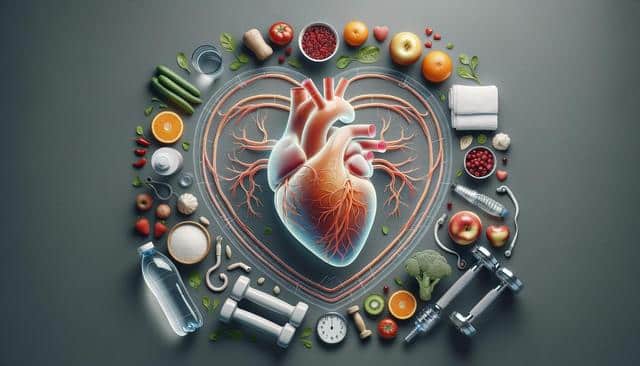
Simple Lifestyle Changes to Support Artery Health
Understanding What Clogs Arteries
Arteries become clogged due to the buildup of plaque – a mix of fat, cholesterol, calcium, and other substances found in the blood. This condition, known as atherosclerosis, can reduce or block blood flow, increasing the risk of heart attacks and strokes. While some risk factors are out of your control, like genetics or age, many are related to lifestyle. High intake of saturated fat, lack of physical activity, smoking, and chronic stress are all contributors. Understanding these factors is the first step in making choices that support clear arteries and overall cardiovascular health.
When plaque builds up, the lining of the arteries becomes inflamed. Over time, the plaque hardens and narrows the arteries, restricting the flow of oxygen-rich blood to the body. This process often begins in childhood and progresses silently for years. Fortunately, lifestyle changes can slow, stop, or even partly reverse this process. These changes focus on diet, exercise, and other daily habits that help reduce inflammation and manage cholesterol levels.
Choosing Heart-Supportive Foods
One of the most effective ways to support artery health is through nutrition. Foods high in fiber, antioxidants, and healthy fats can all contribute to improved blood flow and reduced plaque buildup. A heart-supportive diet emphasizes whole, plant-based foods and reduces intake of processed and fatty items. Healthy eating habits may help lower LDL cholesterol (the “bad” kind) and raise HDL cholesterol (the “good” kind), both of which play a role in arterial health.
Here are some food choices that can be helpful:
- Leafy greens like spinach and kale, which are rich in nitrates and antioxidants
- Fatty fish such as salmon and mackerel, which provide omega-3 fatty acids
- Whole grains like oats and brown rice, which offer soluble fiber
- Nuts and seeds, including almonds and flaxseeds, for healthy fats
- Fruits such as berries, apples, and citrus, which contain vitamins and polyphenols
Limiting red meat, full-fat dairy, fried foods, and sugary snacks is also important. Instead of focusing on strict rules, aim for balance and gradual improvements over time.
Staying Active to Boost Circulation
Regular physical activity is essential for maintaining healthy arteries. Exercise not only strengthens the heart muscle but also helps lower blood pressure, reduce cholesterol, and manage weight. These benefits collectively support better blood flow and help prevent further plaque accumulation. Even moderate activity can make a difference, especially if done consistently over time.
Exercise recommendations for artery health include:
- At least 150 minutes per week of moderate aerobic activity like walking or cycling
- Strength training exercises at least twice a week
- Stretching and flexibility movements to support overall mobility
Physical activity also improves insulin sensitivity and reduces inflammation, both of which play a role in atherosclerosis. For those who are new to exercise, starting with short walks and gradually increasing duration and intensity is a good approach. Always consult a healthcare provider before beginning a new exercise routine, especially if you have existing health conditions.
Managing Stress and Avoiding Tobacco
Chronic stress and smoking are two often overlooked contributors to clogged arteries. Stress can raise blood pressure and increase inflammation, both of which strain the cardiovascular system. Finding effective ways to manage stress is important for long-term heart health. Techniques like mindfulness, meditation, spending time in nature, and engaging in hobbies can all help reduce stress levels.
Tobacco use, on the other hand, directly damages the lining of the arteries and contributes significantly to plaque buildup. Quitting smoking can lead to almost immediate benefits for the cardiovascular system. Within hours of quitting, blood pressure and heart rate begin to normalize. Over time, the risk of heart disease drops significantly. Support options for quitting include nicotine replacement therapies, counseling, and support groups.
Reducing alcohol intake can also be beneficial, as excessive drinking may contribute to high blood pressure and other risk factors for atherosclerosis. Small, consistent changes in daily habits often have the biggest long-term impact.
Monitoring Health and Staying Informed
Regular health check-ups are a vital part of preventing and managing clogged arteries. Blood tests can measure cholesterol levels, blood sugar, and markers of inflammation. Blood pressure monitoring is also essential, as high pressure can damage artery walls and speed up plaque buildup. Understanding your health numbers gives you and your doctor a clearer picture of your cardiovascular risk and allows for early intervention when needed.
In addition to regular check-ups, tracking your own habits can be helpful. Keeping a food journal, logging exercise, or noting stress triggers can provide insights and help you stay on track. Many people also find motivation in setting small, achievable goals and celebrating progress along the way.
Knowledge is a powerful tool in maintaining arterial health. Staying informed about the effects of lifestyle choices on the cardiovascular system empowers you to make better decisions. Educational resources, support groups, and professional guidance can all be part of a successful strategy to support long-term heart health.
Conclusion: Taking Action for Long-Term Heart Health
Clogged arteries develop slowly, often without noticeable symptoms. However, the good news is that meaningful lifestyle changes can help protect your heart and improve blood flow. By focusing on a balanced diet, regular exercise, stress management, and avoiding tobacco, you can take control of your cardiovascular health. These actions may not only reduce existing buildup but also prevent future problems. Whether you’re starting fresh or looking to improve current habits, small changes can lead to lasting benefits. Staying consistent and informed is key. Make your health a priority today, and your heart will thank you in the years to come.


